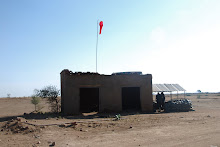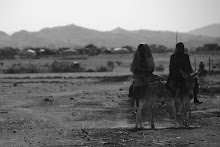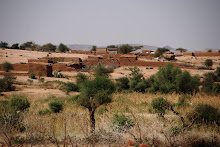UNAMID issued a strange denial yesterday of rumors claiming it had transported armed combatants from one place in Darfur to another. The denial was true, but barely – the combatants weren’t armed at the time they were transferred - and the incident illustrates the continued dominance of a military ethic over a civilian one within UNAMID which marginalizes civil society relative to armed groups in Darfur.
During the fighting in Muhajeriya in South Darfur earlier this month (in was has become a familiar seen in Congo, the Balkans and elsewhere) hundreds of civilians crowded around the UN base seeking protection from the cross-fire of battling JEM and SLA/M (Minni Minnawi) ground troops and later, GoS air bombardment.
The public details are fuzzy, but at some point GoS forces, having realized that the government-affiliated SLA/M troops would be defeated, intervened to forcibly disarm the group before JEM could acquire their weapons. Hundreds of disarmed and vulnerable ex-combatants (SLA/M) then arrived at the UNAMID compound seeking protection and were inexplicably given entry by the commanding officers of the base.
Despite the questionable legality of this move, once the men were inside, the mission was forced to care for them. The fighters were eventually transported by UNAMID helicopter with their consent to more friendly territory in Darfur.
There may have been some rationale behind the decision to admit the disarmed troops and not the civilians – 1) the combatants seeking protection were a smaller group than the civilian population and 2) the SLA/M combatants would more likely have been targeted by victorious JEM rebels - But the incident was clearly a violation of the fundamental principles of humanitarian law prioritizing the sanctity of civilian life in combat.
The series of decisions made during this crisis reveal the prioritization of military concerns over civilian ones within the Mission which has potentially contributed to militarization of the conflict.
The African Union mediated Darfur peace talks in Abuja in 2005 were widely criticized for giving armed factions a much larger seat at the negotiating table than unarmed civil society groups. Since these talks there has been an effort to include civil society in various peace initiatives, but partiality towards armed groups continues on the ground.
UNAMID civilian staff are limited to permanent deployment in the three Darfur capitals while UNAMID military are deployed widely at team sites across the states. The UNAMID military staff on the ground often forge stronger relations with the armed combatants within their area of responsibility, than the civilians. UNAMID commanders develop relationships with rebel and army commanding officers, and rely on each other for information, protection, and logistical arrangements
When an incident of note occurs, civilian staff may conduct 1, 2 or 3 day field mission to the team sites where they interact with a wide variety of civilians. But without being on the ground permanently, UNAMID civilian staff are unable to build lasting relationships with teachers, doctors, artisans, police, local leaders and others.
The majority of information received and disseminated by UNAMID is skewed towards armed groups and filtered through the relations of armed actors on the ground. When calls for more peacekeepers are made in the international press, it must be noted that these “peacekeepers” are not experts in humanitarian law, and their presence on the ground may actually elevate military over civilian actors in the conflict.
More troops may not be the answer – but rather a new focus on building functioning and lasting relations with a cross-section of Darfur society and the deployment of civilian staff more widely.
Sunday, February 1, 2009
Subscribe to:
Post Comments (Atom)













































1 comment:
interested in hearing what the atmosphere is like on the ground since the rumors on the arrest warrants broke...
Post a Comment